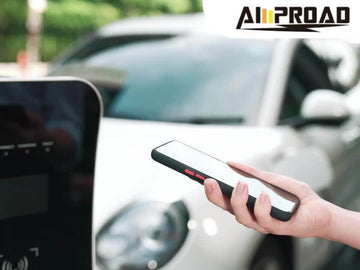
Electric vehicles (EVs) are transforming the way we think about transportation, offering a cleaner, more sustainable alternative to traditional gasoline-powered cars. One of the key considerations for EV owners is the charging process, and understanding how fast a charger can replenish your vehicle’s battery is crucial. In this article, we’ll explore how fast a 7.2 kW EV charger can charge your car, using real-world examples and considering various factors that influence charging speed. We'll also delve into the capabilities of the AMPROAD adjustable portable EV charger, a versatile option for many EV owners.
Understanding Charger Power and Charging Speed
A 7.2 kW charger delivers 7.2 kilowatts of power per hour to the battery of your EV. This type of charger is categorized as a Level 2 EV charger, which is commonly used for home and public charging stations. Level 2 chargers are significantly faster than Level 1 chargers, which use a standard household outlet and typically deliver around 1.2 kW to 1.4 kW.
Typical Charging Rate
The charging rate of a 7.2 kW charger can vary depending on the specific EV model and its battery capacity. Generally, you can expect to add between 18 to 30 miles of range per hour of charging. This variation is due to differences in the efficiency and energy consumption of different EVs.
To give you a practical example, let's consider a car with a 60 kWh battery. Using the formula:
We get:
This calculation assumes ideal conditions and a completely empty battery.
Important Factors Affecting Charging Speed
While the formula above provides a straightforward calculation, several factors can affect the actual charging time:
Battery Capacity
Larger batteries take longer to charge. For instance, a car with a 100 kWh battery will take significantly longer to charge compared to one with a 60 kWh battery when using the same 7.2 kW charger.
State of Charge (SOC)
Charging speed isn't constant throughout the charging process. Typically, charging is faster when the battery is at a lower SOC and slows down as it approaches full capacity. This is because battery management systems reduce the charging power to prevent overheating and prolong battery life.
Battery Health
Over time, batteries degrade and lose some of their capacity to hold a charge. A degraded battery might charge more slowly than a new one.
Charging Infrastructure
The efficiency of the EVCS and the quality of the electrical installation can also impact charging speed. High-quality, well-maintained charging stations tend to be more efficient.
Car Model
Different car models have varying charging capabilities. Some EVs are designed to handle higher power inputs more efficiently than others.
Real-World Charging Time
Given these variables, the actual charging time can differ from the theoretical value. In real-world scenarios, it's often recommended to charge your EV up to 80% rather than 100%. This practice not only helps maintain battery health but also takes advantage of the faster charging rates at lower SOC levels.
Example 1: Charging a Tesla Model 3
The Tesla Model 3, a popular EV, comes with various battery options. Let’s consider the Long Range version, which has a 75 kWh battery:
Using a 7.2 kW charger:
However, in real-world conditions, especially if you're charging from 20% to 80%, the time might be shorter due to the faster initial charging rate.
Example 2: Charging a Nissan Leaf
The Nissan Leaf, another widely-used EV, has a 40 kWh battery in its standard version:
Using a 7.2 kW charger:
Again, real-world factors will influence this time, but this provides a good estimate.
The AMPROAD Adjustable Portable EV Charger
The AMPROAD adjustable portable EV charger is an excellent example of a versatile Level 2 charger. It offers flexibility in charging rates, which can be particularly useful for managing different EV models and battery conditions. Being portable, it’s also ideal for users who need a reliable charging solution on the go.
Features of the AMPROAD Charger
-
Adjustable Amperage: Users can adjust the charging amperage to match their vehicle’s requirements and the available power supply. This helps in optimizing the charging speed and efficiency.
-
Portability: The compact design makes it easy to carry and use at different locations, ensuring you’re not dependent on a single charging point.
-
Safety Features: Equipped with multiple safety mechanisms, including over-voltage, under-voltage, and over-temperature protections, it ensures safe and reliable charging.
-
Compatibility: It supports a wide range of EVs, making it a versatile option for households with multiple electric cars.
By adjusting the amperage, the AMPROAD charger allows users to fine-tune their charging process, potentially speeding it up or slowing it down as needed to suit different scenarios.
Balancing Speed and Efficiency
A 7.2 kW charger is a robust option for home EV charging, providing a good balance between speed and cost-effectiveness. While the exact charging speed will vary depending on your car's battery and several other factors, you can expect to add between 18 to 30 miles of range per hour of charging.
Factors such as battery capacity, state of charge, battery health, and the efficiency of the charging infrastructure all play a significant role in determining the actual charging time. Moreover, the specific EV model you own will also influence how quickly it charges.
Real-world charging times are often less predictable due to these variables, and it's generally recommended to charge up to 80% for optimal battery health and efficiency. Tools like the AMPROAD adjustable portable EV charger offer added flexibility and convenience, allowing you to manage your charging process more effectively.
In summary, if you’re considering a 7.2 kW charger for your EV, it’s a solid choice that can meet most home charging needs. Understanding the factors that affect charging speed will help you make the most of your charging setup, ensuring that your EV is always ready for the road.



